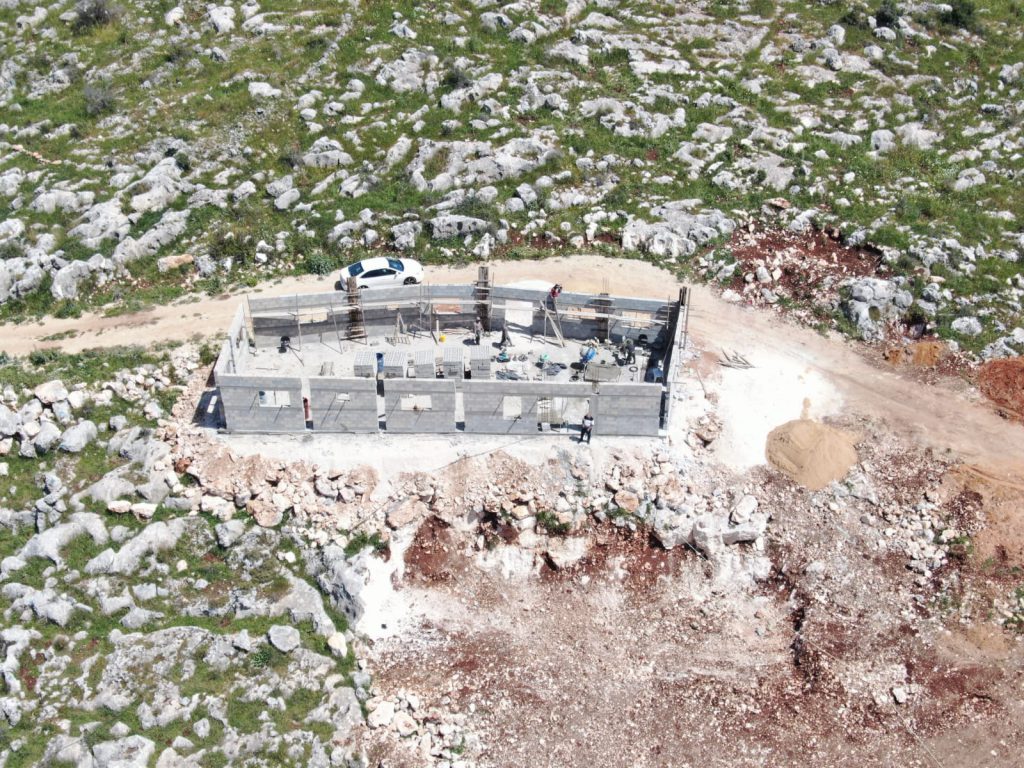The State of Israel enacted an effective enforcement order to fight the Palestinian takeover of Judea and Samaria, but the Civil Administration has refrained from using it – despite the approval of the High Court of Justice. Now, the Regavim Movement and the Samaria Regional Council have submitted a High Court petition demanding that the legislation be applied against Palestinian invasion of an archaeological site in Samaria.
Over the past several months, Regavim has documented a persistent stream of incursion and annexation, as residents of Burkin, a village located in the area under Palestinian Authority jurisdiction, have taken over a significant parcel of land in the Ariel Commercial Zone – located in Area C, under full Israeli jurisdiction.
The area that is being quietly annexed is adjacent to an archaeological site known as Khirbet Khurkosh, where a magnificent Hellenistic Era mausoleum was discovered, along with other remains dating from the Iron Age through the Middle Ages.
This gradual annexation began with road work, which was soon followed by land clearing and preparation for agricultural work. Mature olive trees were quickly planted, in an attempt to make the newly-cleared area look “old” – and now, a large structure, already connected to electricity infrastructure despite its considerable distance from the village, is nearing completion. This entire project is unfolding on “survey land,” Israeli state land for which full registration has not been completed.
The recently-filed High Court petition emphasizes that six different requests for enforcement were submitted to the relevant authorities at each of the stages of the annexation process, but the work continued, unhindered, and no discernable enforcement has been carried out.
For years, the Palestinian Authority and its partners in the European Union have exploited the Israeli bureaucratic and legal systems, successfully preventing law enforcement against illegal Palestinian annexation.
In 2018, the “Order for the Removal of New Illegal Structures” was enacted by the defense establishment and the State Attorney’s Office as part of the “Battle for Area C.” This legislation allows the demolition of new structures built without a permit within six months of construction. The order may be implemented within 96 hours of issuance of an eviction order.
The “Removal of New Structures” order is an effective enforcement tool that makes it possible to streamline the law enforcement process and make it more difficult for offenders to establish facts on the ground by abusing the judicial process.
After the “Removal of New Structures” order was enacted, left-wing organizations petitioned the High Court of Justice to strike it down, but their petition was rejected and the High Court approved the order’s use. Nonetheless, to this day the state has made minimal use of this order, despite the fact that it has proven to be the most efficient and effective tool in the fight against illegal construction.
In the petition filed by Regavim Movement and the Samaria Regional Council, attorneys Avi Segal and Yael Cinnamon requested that the High Court order the authorities to apply the “Order for Removal of New Structures” against the ongoing invasion of Khirbet Khurkosh.
Samaria Council Chairman Yossi Dagan said: “The Security Cabinet announced its intention to battle the PA’s annexation of Area C, and the time has come for the enforcement authorities to act accordingly – to approach the problem in a systematic fashion and to act systematically. We must stop the Palestinian Authority’s rampage, and tell them, loudly and clearly, who’s the boss.”
The joint petition stresses that “this case illustrates the PA’s systematic, well-financed and carefully-planned takeover of Area C, which seeks to shift the focal point of Palestinian development from Area B to Area C. The Palestinian Authority is establishing facts on the ground in order to tie Israel’s hands – both in terms of current security considerations and in terms of political leverage in strategic points in Area C. These one-sided facts on the ground will impact the opening positions for future negotiations, and the State of Israel must address them right now.”

Related Posts
Beit Fajjar quarry: Judge gives State 60 days to do homework
“Have any of you ever been to the quarry?” – that’s what the judge asked the State representatives in last week’s District Court hearing in the case of the Beit Fajjar quarry. The Beit Fajjar quarry, located in east Gush Etzion and mainly in Area C, is the largest illegal quarry in the country, spreading […]
Illegal Beit Fajjar quarry chips away at ancient aqueduct
The illegal Palestinian quarry in Beit Fajjar has damaged around two kilometers of the ancient aqueduct that runs between Gush Etzion and Jerusalem. The aqueduct, which dates back some 2,000 years to the time of the Second Temple is considered a marvel of engineering, as it twists and turns for a distance of some 40 […]








